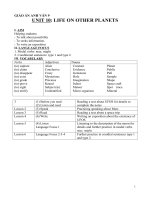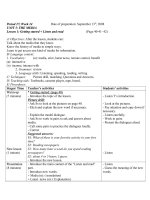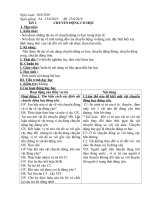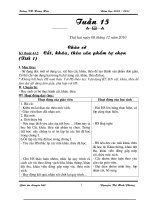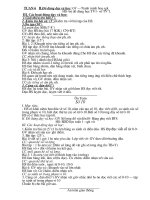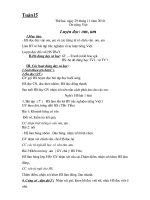Bài soạn Giao an Tieng anh9
Bạn đang xem bản rút gọn của tài liệu. Xem và tải ngay bản đầy đủ của tài liệu tại đây (142.42 KB, 11 trang )
Week: 20
Period: 39.
Writing date: December 20
th
, 2010.
Teaching date: January 3
rd
, 2011.
Unit 6: THE ENVIRONMENT
GETTING STARTED + LISTEN AND READ
I. Aims:
Helping Ss read the paragraph about the work of a group of conservationists and know
more about the environment problems and the solutions.
II./ Objectives.
By the end of the new lesson, Ss will be able to read the paragraph about the work of a
group of conservationists and know more about the environment problems and the solutions.
III./ Language contents :
* Grammar review:
Conditional sentences: type 1
If Clause Main clause
If + S +V(present tense) S + will/shall +V
o
.
* Vocabulary:
Verb: Spray
Nouns: environment, deforestation = the destruction of the forests, garbage dump, dynamite
fishing, Spraying pesticides
Adjective: environmental
IV./ Techniques:
Communicative approach, explanation
V./ Teaching aids :
Teacher: lesson plan , textbook , cassette , tape , picture, poster.
Students :textbook ,notebook , school things .
VI./ Procedures:
Teacher’s and students’ activities Content
T asks Ss to think of the environmental
problems in Tran De District.
Ss think and tell their ideas (may be in
Vietnamese).
T writes their ideas on the board.
1. Warm up:(5’)
Brainstorm: air pollution
Water
pollution
Dynamite fishing
1
Environmental
problems in
our hometown
T presents vocabulary in getting started by
using explaining and pictures.
Ss repeat and write new words in notebook.
T checks new words by using “Rub out and
remember” technique.
Ss practice after the teacher.
T asks Ss to look at the pictures and match
these environmental problems to the pictures.
(p.47)
Ss look at the pictures and match these
environmental problems to the pictures.
T checks and gives feedback.
Ss copy down.
T asks Ss to close their book and introduces:
“Mr. Brown is talking to some volunteers
conservationists. Look at the sentences
and guess the best answers.”
Ss work in pairs and guess.
T writes their guessing on the board. Then T
plays the tape once.
Ss listen and check their guessing.
T plays the tape again and asks Ss to open
their books, listen to the tape and look at
the text( p. 47/48)
Ss do as directed.
T asks Ss to read the text and match the
names in column A with the activities in
column B.
Ss work in groups to match.
* Possible answers:
- The destruction of the forests.
- Rubbish/ garbage/ trash.
- smote from cars, motorbikes…
- smote from factories.
2. Pre – reading : (13’)
*New words:
- environment (n) : môi trường
- environmental (adj) : thuộc về môi trường
- sewage (n) picture : chất thải
- Deforestation: ( n) = the destruction of the
forests : sự tàn phá rừng
-Garbage dump (n): (picture) bãi rác
-Dynamite fishing (n): việc đánh cá bằng
thuốc nổ
-Spraying pesticides: phun thuốc trừ sâu
Checking : Rub out and remember
* Matching
* answer keys:
- Picture a: air pollution
- Picture b: spraying pesticides.
- Picture c: garbage dump
- Picture d: water pollution.
- Picture e: deforestation
- Picture f: dynamite fishing
* Prediction.
1. The volunteer conservationists are …
a. on the beach
b. in the street
c. in the park
2. They are going to ….
a. plant the trees
b. clean the beach.
c. clean the street.
3. While – reading: (13’)
Matching:
2
T calls on some Ss to gives their answer.
Ss give the answer.
T checks and gives the correct answer.
Ss write the correct answer in notebook.
T asks Ss to read the text again and answer
the questions in page 48.
Ss work in pairs.
T calls some pairs to ask and answer in front
of the class.
Ss ask and answer in front of the class then
write their answer on the board.
T checks and gives feedback.
Ss write the correct answer in notebook.
T reviews how to use the conditional
sentences type 1.
Ss listen and write them in notebook.
T gives Ss homework and explains how to
do.
Ss listen and write them in notebook.
T evaluates the period.
Ss listen to the teacher and pay attention to.
Answer key:
Group 1: - f. walk along the shore
Group 2: - e. check the sand
Group 3: - b. check among the rock
Mr. Jones: - a. collects all the bags and
takes them to the dump.
Mrs. Smith - c. Provide the picnic lunch for
everyone.
Mr. Brown - d. give out the bags
4. Post-reading:(12’)
* Answer: (p.48)
1. The speaker is Mr. Brown
2. The listeners are members of volunteer
conservationists
3. They are on the beach
4. They are going to clean the beach
5. If they work hard today, they will make
the beach clean and beautiful again soon
6. (Yes, I have. We clean our school/the
pair/street. We collected the rubbish and take
them to the garbage dump)
7. (If the pollution continues, the
environment around us won’t be good and it
will be harmful to our health, our life)
* Conditional sentences: type 1
If Clause Main clause
If + S +V(present
tense)
S + will/shall
+V
o
.
Ex: If the environment is pollution, it will
effect to our health.
5. Homework:( 2’)
- Learn the vocabulary by heart.
- Re-read the text and answer the questions
(p.48) again.
- Do exercises 1, 3 in exercise books. (p.
41,42)
- Prepare Unit 6: Speak + listen.
3
Week: 20
Period: 40.
Writing date: December 20
th
, 2010.
Teaching date: January 3
rd
, 2011.
Unit 6: THE ENVIRONMENT
SPEAK+ LISTEN
I. Aims:
Helping Ss read the paragraph about the work of a group of conservationists and know
more about the environment problems and the solutions.
II./ Objectives.
By the end of the new lesson, Ss will be able to read the paragraph about the work of a
group of conservationists and know more about the environment problems and the solutions.
III./ Language contents:
* Grammar:
Adverbs clause of reasons: because, as, since.
* Vocabulary:
Verbs: prevent, reduce, wrap, exhaust fume
IV./ Techniques:
Communicative approach, explanation
V./ Teaching aids :
Teacher: lesson plan, textbook, cassette, tape, picture, poster
Students: textbooks, notebooks, school things.
VI./ Procedures:
Teacher’s and students’ activities Content
T asks Ss some questions.
Ss listen and answer the teacher’s questions.
T checks and leads
T leads into the new lesson, using the answer
of the question 4. “We you should do
something to protect the environment. If
the pollution continues, the environment
around us will be harmful to our health,
our life.”
Ss listen to the teacher.
1. Warm up:(5’)
Chatting:
Questions:
a. Have you ever done something to protect
the environment? If yes, what did you do?
Where did you do it?
b. What do you do with used bottles and
cans, plastic bags at home?
c. What should you do to keep your school
clean?
d. If the pollution continues, what might
happen?
4
T gives new words guides Ss to pronounce.
Ss listen and repeat words (in chorus,
individual). Then Ss write new words in
notebooks.
T checks vocabulary by technique
“matching”
T asks Ss to read the words in yellow box.
Ss read the words in yellow box.
T explains.
Ss write notes
T asks Ss to read the words in section a) and
questions in section b) then match
Ss read the words in section a) and questions
in section b) then match
T checks and gives feedback.
T asks Ss to persuade your partners to do
things to protect the environment.
(depending on the cues in section a)
Ss persuade their partners to do things to
protect the environment.
T calls some pairs to practice in the front of
the class.
Ss practice in the front of the class.
T checks and corrects Ss’ mistakes if
necessary.
2. Pre- speaking:(13’)
*New words
- wraps (v) (translation) : gói, bọc, làm kín
- reduce: (v) ( Example) : giảm
- faucet: (n) (picture) vòi
-Exhaust fume: ( example) Smoke from
factories or cars, motorbikes…: Khí thải.
- leaf – leaves (real thing) lá
Prevent (v) (translation) ngăn ngừa, ngăn cản
Checking: “matching”
Notes:
I think you should ……
Won’t you ……
It would be better if you ……
Can I persuade you to Why don’t you ….
Why not…….
Express persuasion…..
* Matching: Questions.( Exercise b. p.49.)
Possible answers:
1. How can we save paper?
I think you should recycle used paper,
newspaper/ write on both sides of the paper/
use banana leaves for wrapping.
2. How can we use fewer plastic bags?
How about cleaning and reusing them?
Why not use paper bags instead of plastic
bags?...
3. While – speaking (12’)
*Work in pairs
* Example 1:
S1: I think it would be better if we use banana
leaves instead of paper or plastic bags to
wrap food.
S2: Why? How come?
S1: Because plastic bags are very hard to
dissolve. They will cause pollution. And if we
use less paper, we can save trees in the forest.
That’s how we can save the environment.
Example 2:
5
